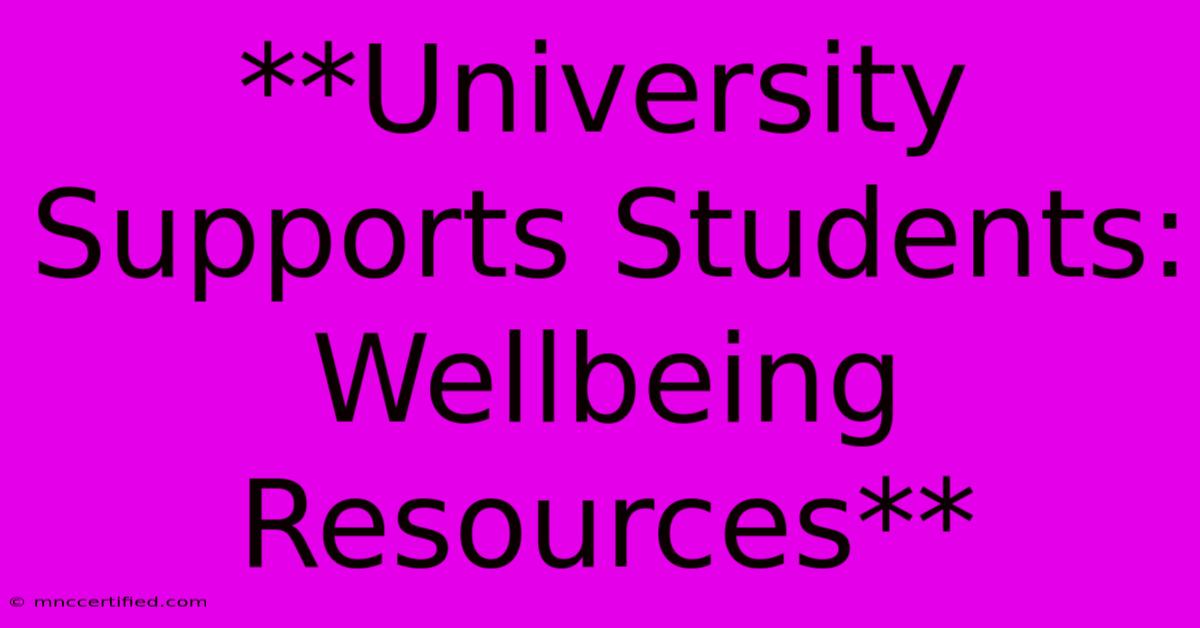**University Supports Students: Wellbeing Resources**

Table of Contents
University Supports Students: Wellbeing Resources
Navigating university life can be both exhilarating and challenging. It's a time of incredible growth, new experiences, and academic demands. To ensure students thrive, universities offer a range of resources that support their wellbeing.
This article explores some of the key resources universities provide, helping students navigate academic pressures, social connections, and personal growth.
Academic Support: A Foundation for Success
University life is synonymous with academic success, but it can also come with its share of stress. Universities understand this and offer numerous academic support resources designed to help students excel:
- Academic Advising: Meeting with an advisor can provide clarity on course selection, degree requirements, and potential career paths.
- Tutoring Services: Struggling with a specific concept? Tutoring provides personalized support in a range of subjects, from math and science to humanities and languages.
- Writing Centers: University writing centers offer valuable guidance on everything from essay structure and organization to grammar and citation style.
- Library Resources: Beyond books, university libraries offer access to vast online databases, research tools, and knowledgeable librarians who can help students find the resources they need.
Mental Health and Wellness: Prioritizing Well-being
Mental health is an essential aspect of overall well-being, and universities prioritize it with a variety of resources:
- Counseling Services: University counseling centers offer confidential support for students struggling with anxiety, depression, relationship issues, and more. They provide individual therapy, group sessions, and crisis intervention services.
- Stress Management Workshops: Workshops and programs teach students coping mechanisms for stress, anxiety, and time management.
- Peer Support Groups: Connecting with peers facing similar challenges can provide valuable support and a sense of community.
- Campus Wellness Programs: Many universities offer wellness programs that promote healthy lifestyle choices, including exercise, nutrition, and mindfulness practices.
Social Connections and Community
Feeling connected and part of a community is vital for student well-being. Universities foster this through various initiatives:
- Student Organizations: From academic clubs to sports teams, music groups, and volunteer organizations, students can find their niche and build meaningful relationships.
- Social Events and Activities: Universities often host social events, campus gatherings, and recreational activities to encourage interaction and community building.
- Campus Recreation: Fitness centers, sports leagues, and outdoor activities offer opportunities for physical activity and social engagement.
Financial Support: Easing Financial Burdens
Financial stress can significantly impact a student's academic performance and overall well-being. Universities provide a range of financial support options:
- Scholarships and Grants: Students can apply for scholarships based on academic merit, financial need, or specific criteria.
- Student Loans: Universities often offer information and assistance with navigating student loan options.
- Work-Study Programs: These programs allow students to earn money while gaining valuable work experience on campus.
Utilizing University Resources: A Key to Success
Taking advantage of the resources available is crucial for students to thrive in their university journey. Here are some tips:
- Be proactive: Don't hesitate to reach out to advisors, counselors, or support staff when you need help.
- Explore opportunities: Discover the wide range of student organizations, events, and activities your university offers.
- Prioritize well-being: Make time for self-care, exercise, and healthy habits.
- Connect with others: Build relationships with classmates, professors, and staff.
University life presents unique challenges and rewards. By utilizing the wellbeing resources offered, students can overcome obstacles, connect with their peers, and achieve their academic goals while nurturing their overall well-being.

Thank you for visiting our website wich cover about **University Supports Students: Wellbeing Resources**. We hope the information provided has been useful to you. Feel free to contact us if you have any questions or need further assistance. See you next time and dont miss to bookmark.
Featured Posts
-
Badenoch Demands Apology For Lammys Derogatory Comments
Nov 07, 2024
-
Usha Vance Americas New Second Lady
Nov 07, 2024
-
October Airline Stocks Outpace S And P 500
Nov 07, 2024
-
Republicans Control Senate Whats The Impact
Nov 07, 2024
-
Fc Barcelona Vs Crvena Zvezda Live Champions League Match
Nov 07, 2024